Certificate on Mediation
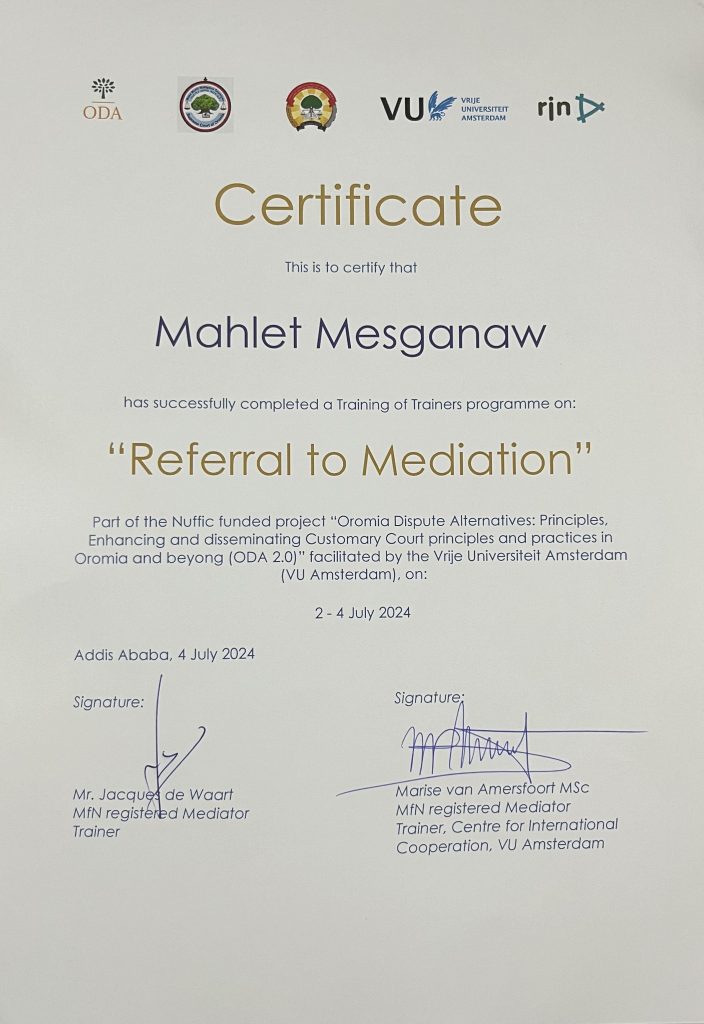
Congratulations for Mahlet Mesganaw, Partner at DMLF, for her achievement of Certificate on Mediation for Trainers from VU Amsterdam.

Congratulations for Mahlet Mesganaw, Partner at DMLF, for her achievement of Certificate on Mediation for Trainers from VU Amsterdam.
Partners to DMLF namely Mr.Dagnachew Tesfaye Abetew and Mrs.Mahlet Mesganaw Getu are proud to announce the membership to the American Bar Association (ABA). We hope the ABA membership will provide us with professional advantages in building networks for rendering life changing legal services for our communities.


By DMLF
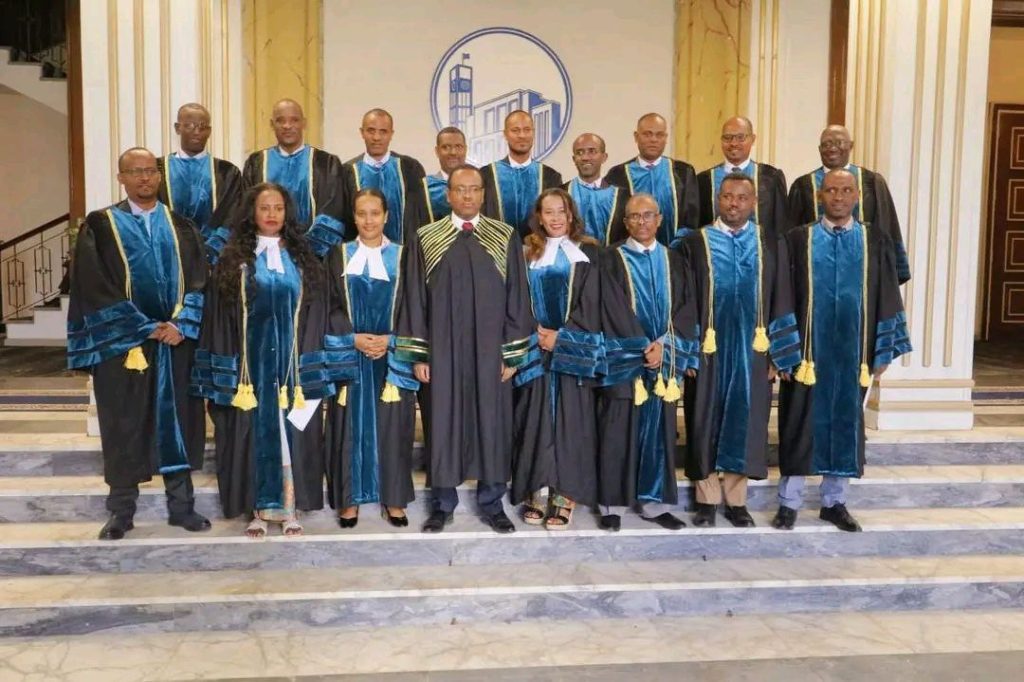

The FDRE House of Peoples Representative on March 12, 2024 appointed 16 judges for judgeship at the Federal Supreme Court. The Constitutional procedure for appointment of Federal Judges is that the Federal Judicial Administration Council shall select candidates. Then the Prime Minister shall submit these candidates to the House of Peoples’ Representatives for appointment. Accordingly, 3 women and 13 men were appointed Federal Supreme Court Judges. The Federal Supreme Court has first instance jurisdiction, appellate jurisdiction and power of cassation, as per Federal Courts Proclamation No 1234/2021.
The FDRE Constitution on Article 79 Sub-article 3 guarantees that judges shall exercise their functions in full independence. Judges are expected to be directed solely by the law.
No judge shall be removed from their duties before the judge reaches the retirement age determined by law. The current Public Servants’ Pension Proclamation No 1267/2022 specifies 60 years, as the retirement age of a public servant, that includes judges as well. The FDRE Constitution states that such a retirement age that is determined by law cannot be extended for a judge.
However, there are exceptions whereby a judge is removed from office prior to retirement age. These include where the Judicial Administration Council decides to remove the judge for violations of disciplinary rules or on the ground of gross incompetence or inefficiency; or where a judge can no longer carry out his/her responsibilities on account of illness. Such assessment and decision of the Judicial Administration Council has to be approved by the majority vote of the House of Peoples Representative.
By Mahlet Mesganaw, Partner at DMLF
Women, Business and the Law (WBL) 2024 is the 10th in a series of studies measuring the laws that affect women’s economic opportunities in 190 economies of the world. This year’s edition will be out in March 2024. For more than a decade, WBL has analyzed the laws and regulations that affect women’s economic opportunity. However, laws alone are not enough to improve gender equality. Their implementation and enforcement are critical to the full realization of women’s rights.
As a result, WBL 2.0 was introduced. The new additions as indicators are Safety and Childcare. The previous namely mobility, workplace, pay, marriage, parenthood, entrepreneurship, asset and pension remain intact. This year’s edition goes beyond what is there in the law; it further looks into implementation on the ground.
This 2024 edition of WBL is coined in two versions of the legal index. The first WBL 1.0 is to update data within reforms implemented from Oct 2,2022 to Oct 1,2023. WBL 2.0 on the other hand is a new index that includes additional indicators of safety and childcare.
The WBL 2.0 looks into a)the legal framework (measures the state of the law within a given economy in relation to a specific right), b)Supportive framework (capture the existence of policy mechanisms to implement rights) and c) Expert Opinions( shed light on the progress towards realizing a particular right).
Consequently, Ethiopia scored 80.0 on WBL 1.0 legal framework but scored 60 on WBL 2.0 legal framework score, 30.8 on WBL 2.0 Supportive Framework and 43.1 on WBL 2.0 Expert Opinion Score. Italy has the highest WBL 2.0 legal framework score of 95.0, whereas 15.0 on WBL 2.0 legal framework score is by West Bank and Gaza.
For details on the data you may click here.
Partners at DMLF has taken the Mediation Training Program organized by Federal Supreme Court of Ethiopia in collaboration with Free AMSTERDAM UNIVERSITY. The training occurred from February 1-6,2024. The training aimed at teaching the practical skills in conducting court-annexed mediation. The participants were judges, assistant judges, lawyers, advocates, social workers and engineers.
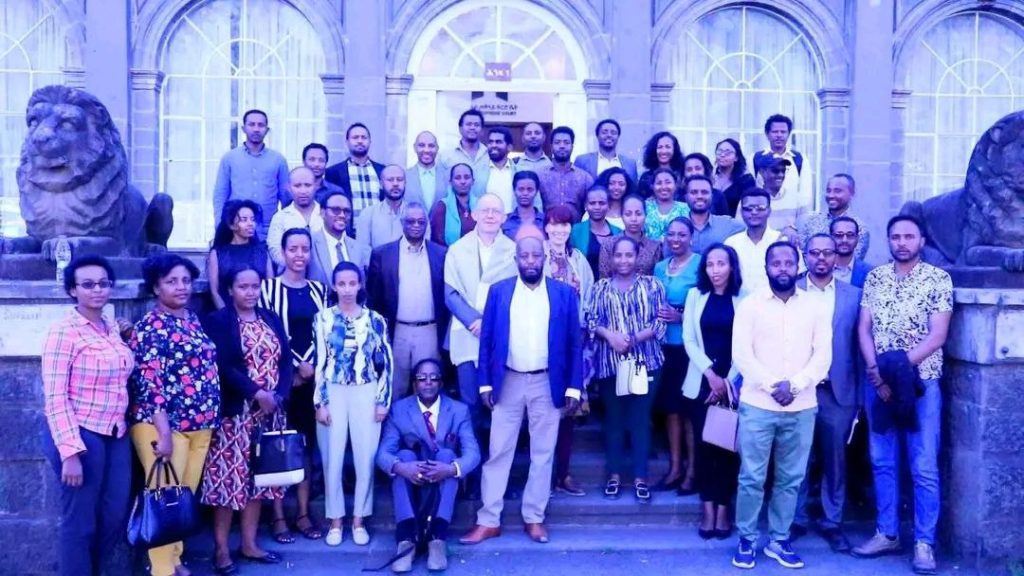





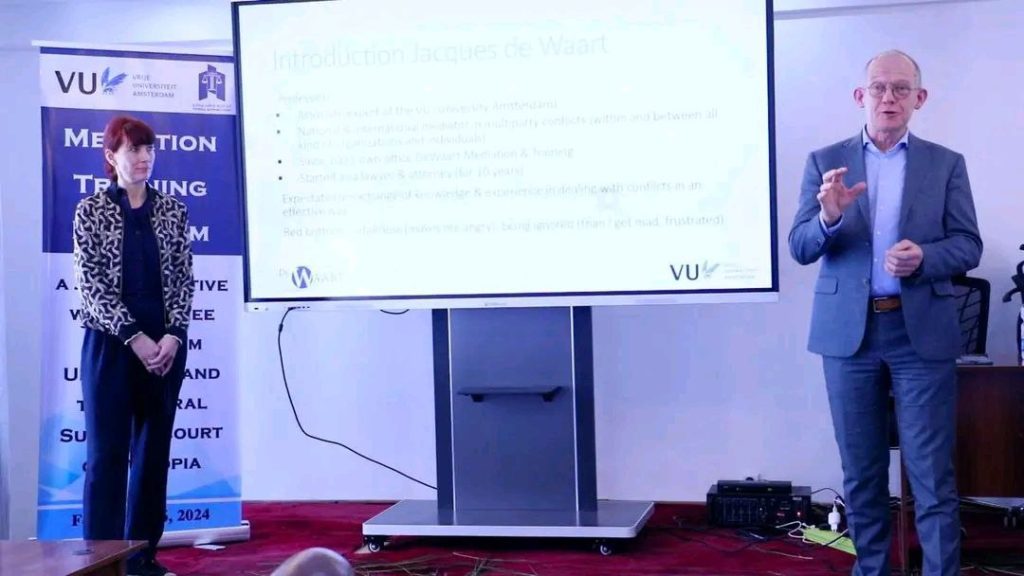

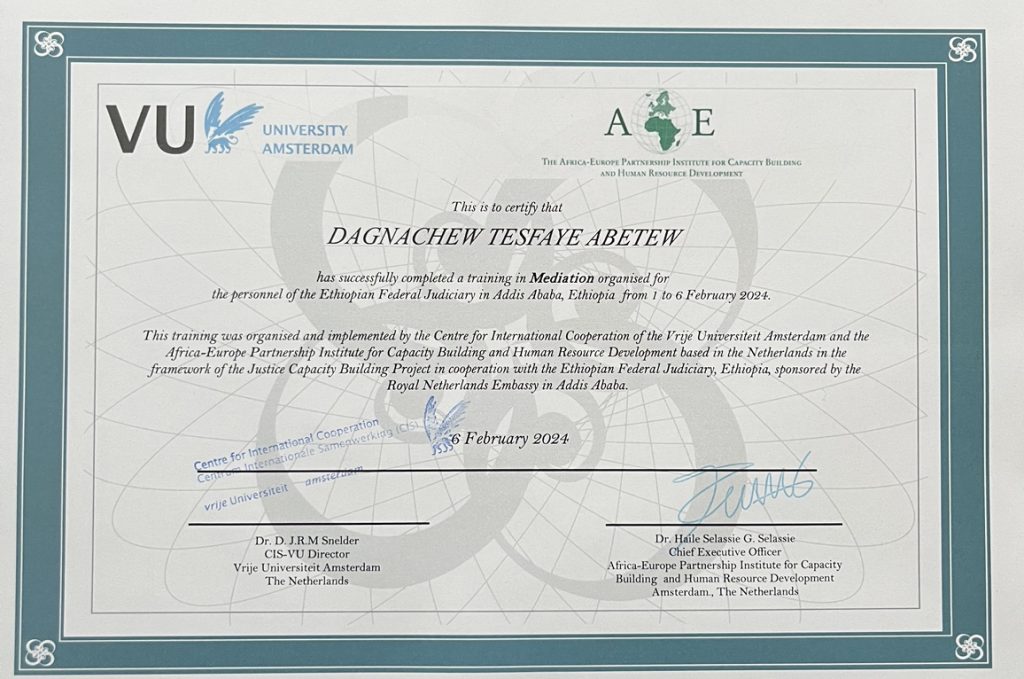

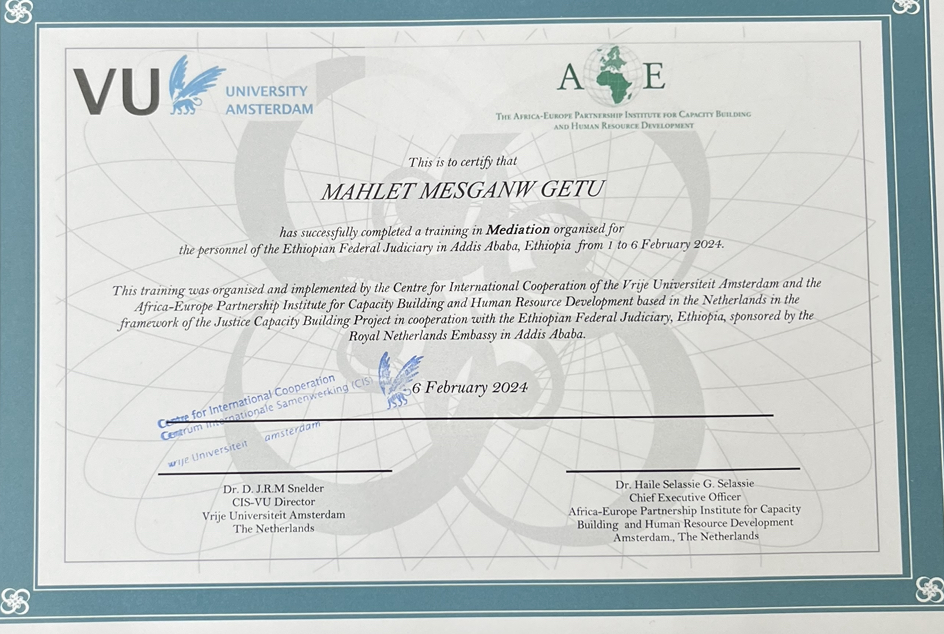

The Federal Supreme Court with collaboration with the Artificial Intelligence Institute developed automatic transcription, smart chatbot, and digital information desk. The introduction ceremony was held on January 6,2024 at the compound of the Federal Supreme Court, in Addis Ababa.


By Dagnachew Tesfaye, Managing Partner DMLF
The Ethiopian Prime Minister Dr. Abiy Ahmed extended an invitation to second generation Ethiopians diasporas to come and reconnect with their Ethiopian origin. The invitation remains intact from the end of December 2023- to September 20, 2024. Ethiopian airlines, hotels, tour companies, and transport services shall be accommodating the trip of these second generation diasporas with a discounted rate. Expediated customs and immigration services shall also be implemented. The trip is divided into three rounds.
The first round is named ‘ connect to your multi-cultural roots’. This round is from end of December 2023- beginning of February 2024. This is to remind those second generation Ethiopians to understand, experience and connect with their culture and celebrate national holidays with their Ethiopian counterparts that fall within this round.
The second round is named ‘connect to your historical roots’. The timeline is from the end of February 2024 to beginning of May 2024. This is aimed to reconnect them to their historical heritages that are based in religion, faith and culture.
The third round is from the end of June 2024 to the beginning of September 20, 2024. The theme of the third round is ‘ leave your legacy’. The second generation Ethiopians shall participate in planting seedlings and participate in multiple voluntary summer works.
The aim is for these second generation Ethiopians to know and experience their country first-hand, and come and serve their country in the future. Ethiopian children adopted under international adoption who are living abroad, who wish to know more about their country of origin, may make the best out of this grand invitation of the PM. The FDRE Ministry of Tourism has organized a task force for smooth execution of the invitation. See attached for the invitation of the PM Dr.Abiy Ahmed,
For any related inquiries, you may contact us at info@dmethiolawyers.com


By DMLF Team


The Federal Supreme Court has introduced a draft new regulation for discussion on court fees. Ethiopia has been using Legal Notice 1945 E.C as the court fee structure up to now. The Federal Supreme Court is suggesting it is timely to upgrade and update on court fees. Therefore the court floated for discussion the new draft Federal Courts Court Fee Structure Regulation. Access to justice has to be the core issue. The higher the court fee, the higher the probability that clients both individuals and companies, may lay down claims or legal actions due to significant fees they will be required to pay. The trend for example in Ras Al Khaimah, Dubai and Abu Dhabi has been to establish a cap for all civil and commercial claims. First the court fees are usually calculated based on a percentage of the claim amount in the statement of claim. Then once the claim amount exceeds a specific amount, the court fee is usually capped to a maximum amount regardless of the percentage value. For example the UAE capped court fees at AED 40,000 for claims exceeding AED 1,000,000. The plaintiff is subject not only to court fee, but lawyer’s fee, translation fee and stamp duty. All these fees are advance fees paid prior to opening a file in court of law. There are other fees paid in litigation like fees for injunction order, judgment or decree, amendment of claim or defense, penalties for missing court appointments, expert fees, witness expenses etc. These are hidden fees that pop up during litigation.
The Federal Courts announced officially the commencement of the calendar year 2016 E.C(2023/2024) as of October 12,2023. Article 38 of the Federal Courts Proclamation No 1234/2021 reiterate that federal courts shall be closed from July 08 to October 11 of every year. During the recess of the courts, emergency cases were tried by judges who work overtime voluntarily.